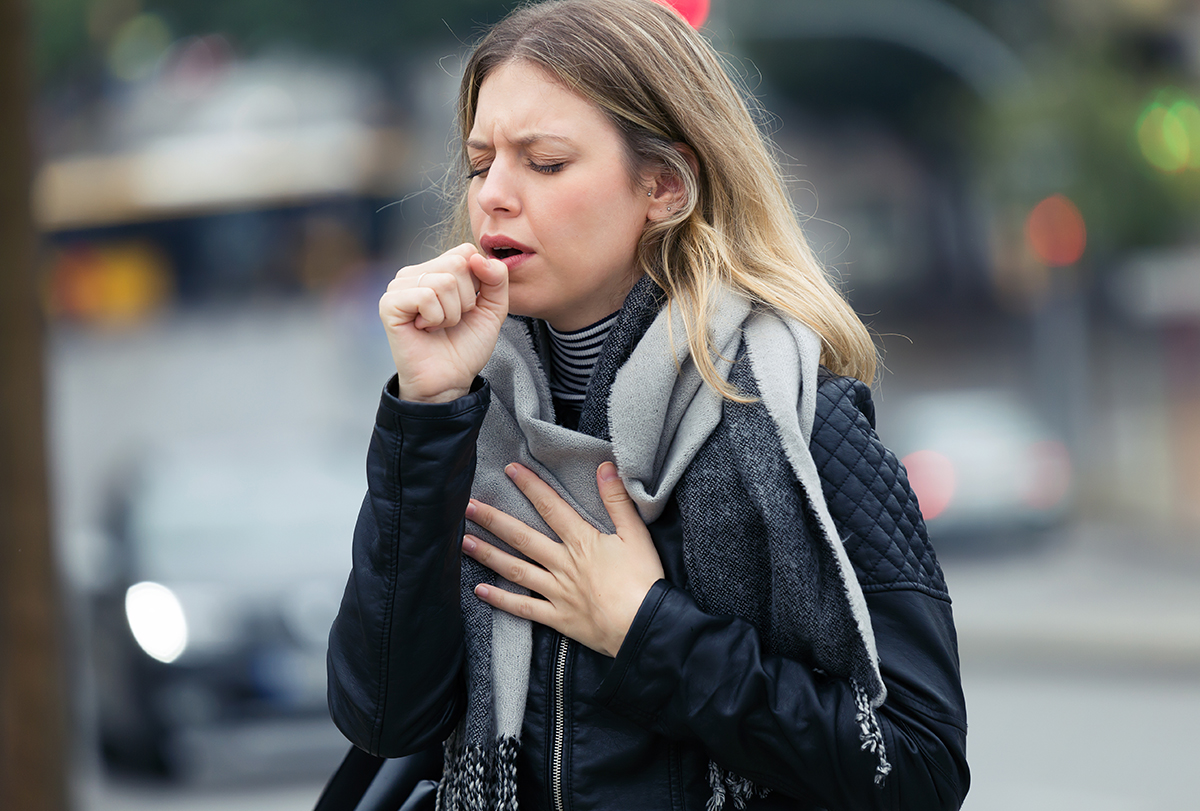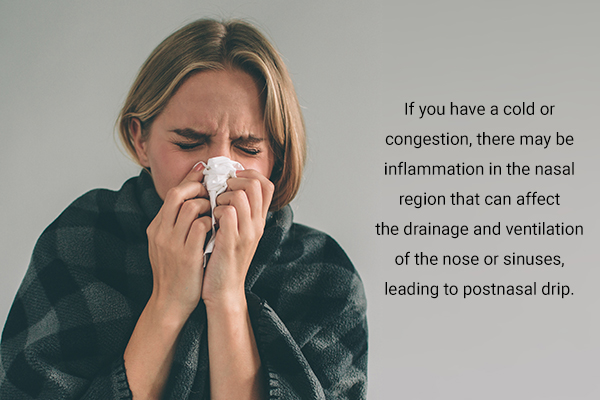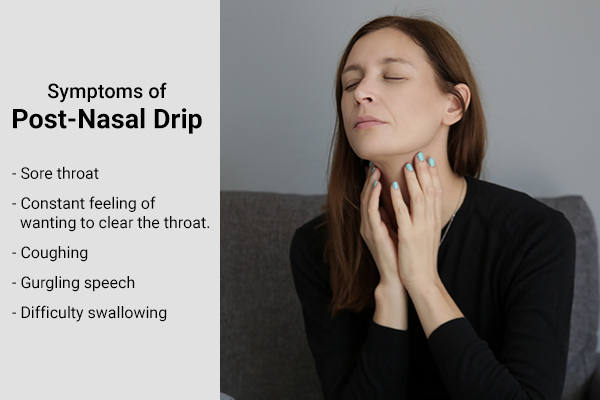In this article:
There are glands in the lining of your various tracts and organs that produce mucus. The same is true for your nose. Mucus is produced by the body to moisten the areas and trap foreign particles such as disease-causing microbes.

Normally, mucus in the nasal cavity drips down the throat for you to swallow after being mixed with saliva, but if the mucus produced is more and thicker than normal, problems may arise.
When the excess mucus comes out of your nose, it causes a runny nose. When mucus runs to the throat, it is known as a postnasal drip. (1)
What Causes Postnasal Drip?
Postnasal drip is a pretty common issue and can be due to various reasons.
1. Allergies
When you have allergies, in order to fight that allergic reaction, your body will be prepared in such a way that there may be increased chances that your blood vessels will circulate more blood throughout your body, which in turn, can cause loss of fluids and electrolyte imbalance.
To verify the link between postnasal drip and allergy, you have to get checked for sensitivity to allergens, family history, and the presence of moist, grayish nasal mucosa. An ENT expert will also inspect for allergic responses to pollen, dust, pet fur, and other allergens. (2)
2. Insufficient humidity and dry air
Low humidity may cause almost negligible airflow to the nasal passages. Dry weather can cause mucus in the nose to dry up.
The dry air can have a negative impact on nasal cilia and the blood flow to the nasopharynx. It also increases the thickness of mucus. These effects lead to the accumulation of viscous secretions, leading to postnasal drip. (2)
3. Sinusitis
If you suffer from chronic sinusitis, nasal discharge may accumulate in both the anterior and posterior parts of the nose. The accumulation of discharge in the posterior part contributes to postnasal drip. (2)
4. Common cold

During a bout of colds or congestion, inflammation in the nasal region occurs that can affect the drainage and ventilation of the nose or sinuses, leading to postnasal drip. (2)
5. Gastroesophageal reflux disease
Recent evidence suggests that GERD (gastroesophageal reflux disease) does not play a causative role in Chronic Rhino Sinusitis. However, there is evidence of an oesophageal-nasal reflex, particularly in regard to mucus secretion and symptoms of postnasal drip. (3)
The presence of gastroesophageal reflux disease (GERD) would, thus, be anticipated to exacerbate nasal symptoms. (3)
6. Dehydration, pollution, cigarettes, and nasal polyps
Experts explain that a decline in fluid intake (dehydration) because of any reason can cause postnasal drip. Furthermore, pollution and cigarette smoke can lead to postnasal drip, as well as other issues that affect the nose, such as nasal polyps. (4)(5)
7. Laryngopharyngeal reflux
Laryngopharyngeal reflux (LPR) is comparable to GERD. It happens when the lower esophageal sphincter (LED) does not shut properly and the stomach contents are permitted to leak back or reflux into the esophagus and then up to the voice box and perhaps the back of the nose and sinus cavity.
When the refluxed stomach acid moves toward the lining of the esophagus, it causes a burning feeling in the chest or in the throat, known as heartburn or acid indigestion.
Experts say that when stomach contents irritate the voice box and back of the throat/nose, symptoms occur such as postnasal drip, throat clearing, cough, and a lump in the throat. (6)
A correct diagnosis by an ENT professional of the underlying issue is important to adequately treat a patient with postnasal drip.
8. Systemic conditions
There may be hypersecretion in the nose due to systemic conditions including:
- Menopause
- Pregnancy
- Hypothyroidism
- Diabetes mellitus
- Anemia
- Nephritis
Postnasal drip is a manifestation of these conditions because of increased nasal secretion. (2)
What Are the Symptoms of Postnasal Drip?

According to the American Academy of Otolaryngology – Head and Neck Surgery, symptoms of postnasal drip include:
- Coughing
- Gurgling speech
- Throat clearing
- Sore throat
- Difficulty swallowing
How Is Postnasal Drip Treated?
The treatment for postnasal drip depends upon its cause. The common treatments would include remedies and over-the-counter medicines. (7)(1)
- Antibiotics can clear up bacterial infections, which in many cases are the causes of postnasal drip. Note: If the infection is viral, antibiotics won’t be helpful.
- Antihistamines and nasal decongestants can help with postnasal drip caused by sinusitis and viral infections.
- Steroidal nasal spray and antihistamines are good for postnasal drip caused by allergies.
- Saline nasal spray
- Nasal irrigation
- Corrective surgery in case of septum deviation
Children and Postnasal Drip
It is normal to get concerned when your child suffers from an ailment. In children, thick or bad-smelling secretions from one side of the nose can imply that something is stuck in the nose such as a bean, wadded paper, or a piece of toy.
Experts advise that if these signs are seen, seek help from an ENT doctor instantly.
General Recommendations Regarding Postnasal Drip

A lot of people, particularly the older population, require more fluids to thin out secretions. Experts recommend:
- Drinking more water
- Putting an end to caffeine
- If possible, discouraging diuretics (medications that remove fluid from the body by increasing urination)
When to See a Doctor
Postnasal drip can be tricky to treat and thus may require a proper diagnosis of the underlying cause. Although it can be managed at home, you should go see a doctor if you experience:
- Symptoms persisting for a long duration without improvement
- Mucus with a bad odor
- Wheezing
- Fever
- Blood in the mucus
Final Word
Postnasal drips can be a very annoying condition and prevent you from enjoying your daily life. It can make you feel irritated and keep you from doing your work because of the discomfort that comes with it.
Learning the cause of your condition and figuring out what works for you to manage it will be incredibly helpful in its prevention and management.
 Continue ReadingPostnasal Drip: 6 Home Remedies and Tips to Prevent It
Continue ReadingPostnasal Drip: 6 Home Remedies and Tips to Prevent It
- Was this article helpful?
- YES, THANKS!NOT REALLY


